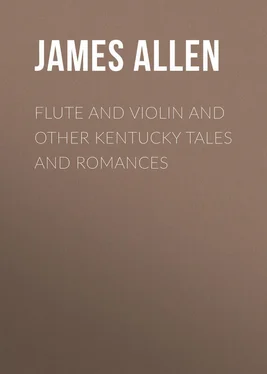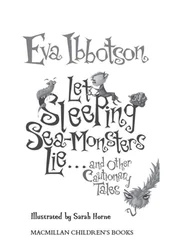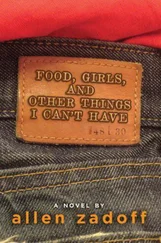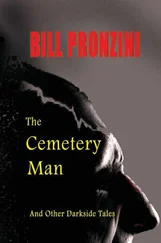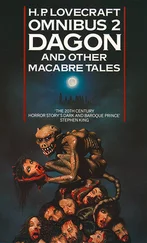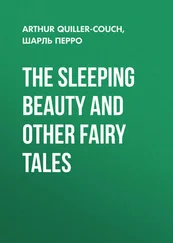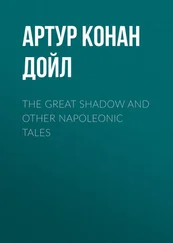James Allen - Flute and Violin and other Kentucky Tales and Romances
Здесь есть возможность читать онлайн «James Allen - Flute and Violin and other Kentucky Tales and Romances» — ознакомительный отрывок электронной книги совершенно бесплатно, а после прочтения отрывка купить полную версию. В некоторых случаях можно слушать аудио, скачать через торрент в формате fb2 и присутствует краткое содержание. ISBN: , Жанр: foreign_prose, на английском языке. Описание произведения, (предисловие) а так же отзывы посетителей доступны на портале библиотеки ЛибКат.
- Название:Flute and Violin and other Kentucky Tales and Romances
- Автор:
- Жанр:
- Год:неизвестен
- ISBN:http://www.gutenberg.org/ebooks/50597
- Рейтинг книги:4 / 5. Голосов: 1
-
Избранное:Добавить в избранное
- Отзывы:
-
Ваша оценка:
- 80
- 1
- 2
- 3
- 4
- 5
Flute and Violin and other Kentucky Tales and Romances: краткое содержание, описание и аннотация
Предлагаем к чтению аннотацию, описание, краткое содержание или предисловие (зависит от того, что написал сам автор книги «Flute and Violin and other Kentucky Tales and Romances»). Если вы не нашли необходимую информацию о книге — напишите в комментариях, мы постараемся отыскать её.
Flute and Violin and other Kentucky Tales and Romances — читать онлайн ознакомительный отрывок
Ниже представлен текст книги, разбитый по страницам. Система сохранения места последней прочитанной страницы, позволяет с удобством читать онлайн бесплатно книгу «Flute and Violin and other Kentucky Tales and Romances», без необходимости каждый раз заново искать на чём Вы остановились. Поставьте закладку, и сможете в любой момент перейти на страницу, на которой закончили чтение.
Интервал:
Закладка:
Flute and Violin and other Kentucky Tales and Romances
PREFACE
The opening tale of this collection is taken from Harper's Monthly; the others, from the Century Magazine . By leave of these periodicals they are now published, and of the kindness thus shown the author makes grateful acknowledgment.
While the tales and sketches have been appearing, the authorship of them has now and then been charged to Mr. James Lane Allen, of Chicago, Illinois – pardonably to his discomfiture.
A sense of fitness forbade that the author should send along with each, as it came out, a claim that it was not another's; but he now gladly asks that the responsibility of all his work be placed where it solely belongs.
FLUTE AND VIOLIN
On one of the dim walls of Christ Church, in Lexington, Kentucky, there hangs, framed in thin black wood, an old rectangular slab of marble. A legend sets forth that the tablet is in memory of the Reverend James Moore, first minister of Christ Church and President of Transylvania University, who departed this life in the year 1814, at the age of forty-nine. Just beneath runs the record that he was learned, liberal, amiable, and pious.
Save this concise but not unsatisfactory summary, little is now known touching the reverend gentleman. A search through other sources of information does, indeed, result in reclaiming certain facts. Thus, it appears that he was a Virginian, and that he came to Lexington in the year 1792 – when Kentucky ceased to be a county of Virginia, and became a State. At first he was a candidate for the ministry of the Presbyterian Church; but the Transylvania Presbytery having reproved him for the liberality of his sermons, James kicked against such rigor in his brethren, and turned for refuge to the bosom of the Episcopal Communion. But this body did not offer much of a bosom to take refuge in.
Virginia Episcopalians there were in and around the little wooden town; but so rampant was the spirit of the French Revolution and the influence of French infidelity that a celebrated local historian, who knew thoroughly the society of the place, though writing of it long afterwards, declared that about the last thing it would have been thought possible to establish there was an Episcopal church.
"Not so," thought James. He beat the canebrakes and scoured the buffalo trails for his Virginia Episcopalians, huddled them into a dilapidated little frame house on the site of the present building, and there fired so deadly a volley of sermons at the sinners free of charge that they all became living Christians. Indeed, he fired so long and so well that, several years later – under favor of Heaven and through the success of a lottery with a one-thousand-dollar prize and nine hundred and seventy-four blanks – there was built and furnished a small brick church, over which he was regularly called to officiate twice a month, at a salary of two hundred dollars a year.
Here authentic history ends, except for the additional fact that in the university he sat in the chair of logic, metaphysics, moral philosophy, and belles-lettres – a large chair to sit in with ill-matched legs and most uncertain bottom. Another authority is careful to state that he had a singularly sweet breath and beautiful manners. Thus it has been well with the parson as respects his posthumous fame; for how many of our fellow-creatures are learned without being amiable, amiable without being pious, and pious without having beautiful manners!
And yet the best that may be related of him is not told in the books; and it is only when we have allowed the dust to settle once more upon the histories, and have peered deep into the mists of oral tradition, that the parson is discovered standing there in spirit and the flesh, but muffled and ghost-like, as a figure seen through a dense fog.
A tall, thinnish man, with silky pale-brown hair, worn long and put back behind his ears, the high tops of which bent forward a little under the weight, and thus took on the most remarkable air of paying incessant attention to everybody and everything; set far out in front of these ears, as though it did not wish to be disturbed by what was heard, a white, wind-splitting face, calm, beardless, and seeming never to have been cold, or to have dropped the kindly dew of perspiration; under the serene peak of this forehead a pair of large gray eyes, patient and dreamy, being habitually turned inward upon a mind toiling with hard abstractions; having within him a conscience burning always like a planet; a bachelor – being a logician; therefore sweet-tempered, never having sipped the sour cup of experience; gazing covertly at womankind from behind the delicate veil of unfamiliarity that lends enchantment; being a bachelor and a bookworm, therefore already old at forty, and a little run down in his toilets, a little frayed out at the elbows and the knees, a little seamy along the back, a little deficient at the heels; in pocket poor always, and always the poorer because of a spendthrift habit in the matter of secret chanties; kneeling down by his small hard bed every morning and praying that during the day his logical faculty might discharge its function morally, and that his moral faculty might discharge its function logically, and that over all the operations of all his other faculties he might find heavenly grace to exercise both a logical and a moral control; at night kneeling down again to ask forgiveness that, despite his prayer of the morning, one or more of these same faculties – he knew and called them all familiarly by name, being a metaphysician – had gone wrong in a manner the most abnormal, shameless, and unforeseen; thus, on the whole, a man shy and dry; gentle, lovable; timid, resolute; forgetful, remorseful; eccentric, impulsive, thinking too well of every human creature but himself; an illogical logician, an erring moralist, a wool-gathered philosopher, but, humanly speaking, almost a perfect man.
But the magic flute? Ah, yes! The magic flute!
Well, the parson had a flute – a little one – and the older he grew, and the more patient and dreamy his gray eyes, always the more and more devotedly he blew this little friend. How the fond soul must have loved it! They say that during his last days as he lay propped high on white pillows, once, in a moment of wandering consciousness, he stretched forth his hand and in fancy lifting it from the white counterpane, carried it gently to his lips. Then, as his long, delicate fingers traced out the spirit ditties of no tone and his mouth pursed itself in the fashion of one who is softly blowing, his whole face was overspread with a halo of ecstatic peace.
And yet, for all the love he bore it, the parson was never known to blow his flute between the hours of sunrise and sunset – that is, never but once. Alas, that memorable day! But when the night fell and he came home – home to the two-story log-house of the widow Spurlock; when the widow had given him his supper of coffee sweetened with brown sugar, hot johnny-cake, with perhaps a cold joint of venison and cabbage pickle; when he had taken from the supper table, by her permission, the solitary tallow dip in its little brass candlestick, and climbed the rude steep stairs to his room above; when he had pulled the leathern string that lifted the latch, entered, shut the door behind him on the world, placed the candle on a little deal table covered with text-books and sermons, and seated himself beside it in a rush-bottomed chair – then – He began to play? No; then there was dead silence.
For about half an hour this silence continued. The widow Spurlock used to say that the parson was giving his supper time to settle; but, alas! it must have settled almost immediately, so heavy was the johnny-cake. Howbeit, at the close of such an interval, any one standing at the foot of the steps below, or listening beneath the window on the street outside, would have heard the silence broken.
Читать дальшеИнтервал:
Закладка:
Похожие книги на «Flute and Violin and other Kentucky Tales and Romances»
Представляем Вашему вниманию похожие книги на «Flute and Violin and other Kentucky Tales and Romances» списком для выбора. Мы отобрали схожую по названию и смыслу литературу в надежде предоставить читателям больше вариантов отыскать новые, интересные, ещё непрочитанные произведения.
Обсуждение, отзывы о книге «Flute and Violin and other Kentucky Tales and Romances» и просто собственные мнения читателей. Оставьте ваши комментарии, напишите, что Вы думаете о произведении, его смысле или главных героях. Укажите что конкретно понравилось, а что нет, и почему Вы так считаете.
